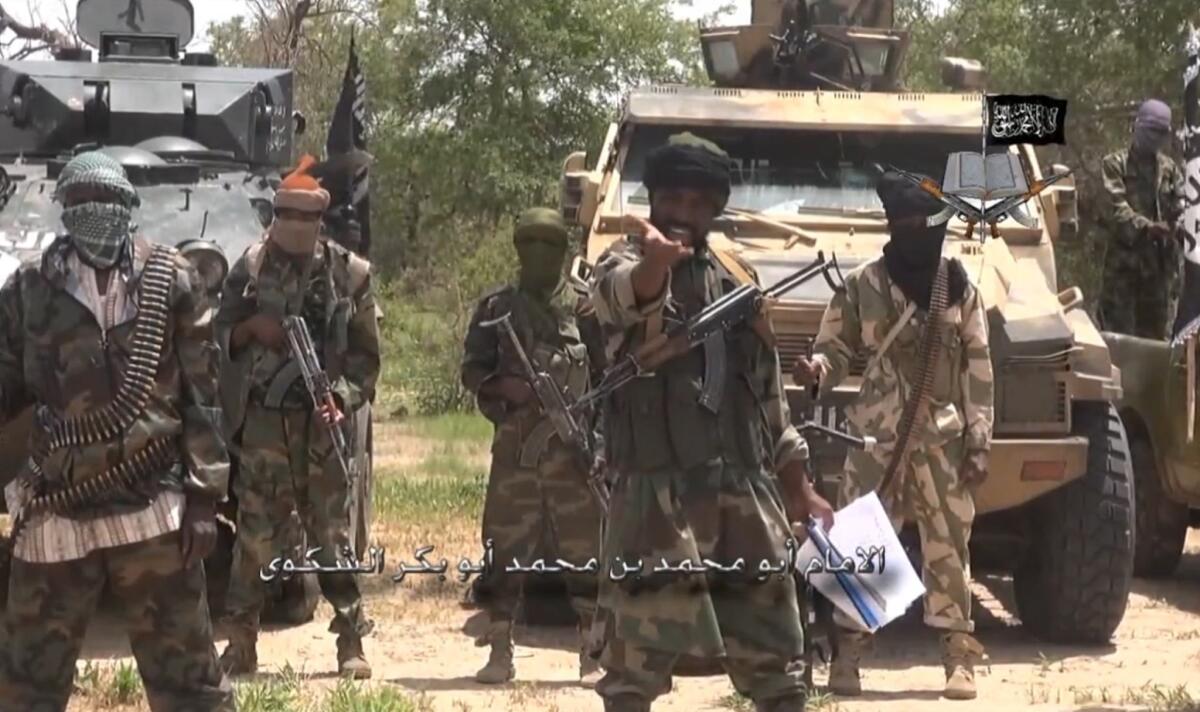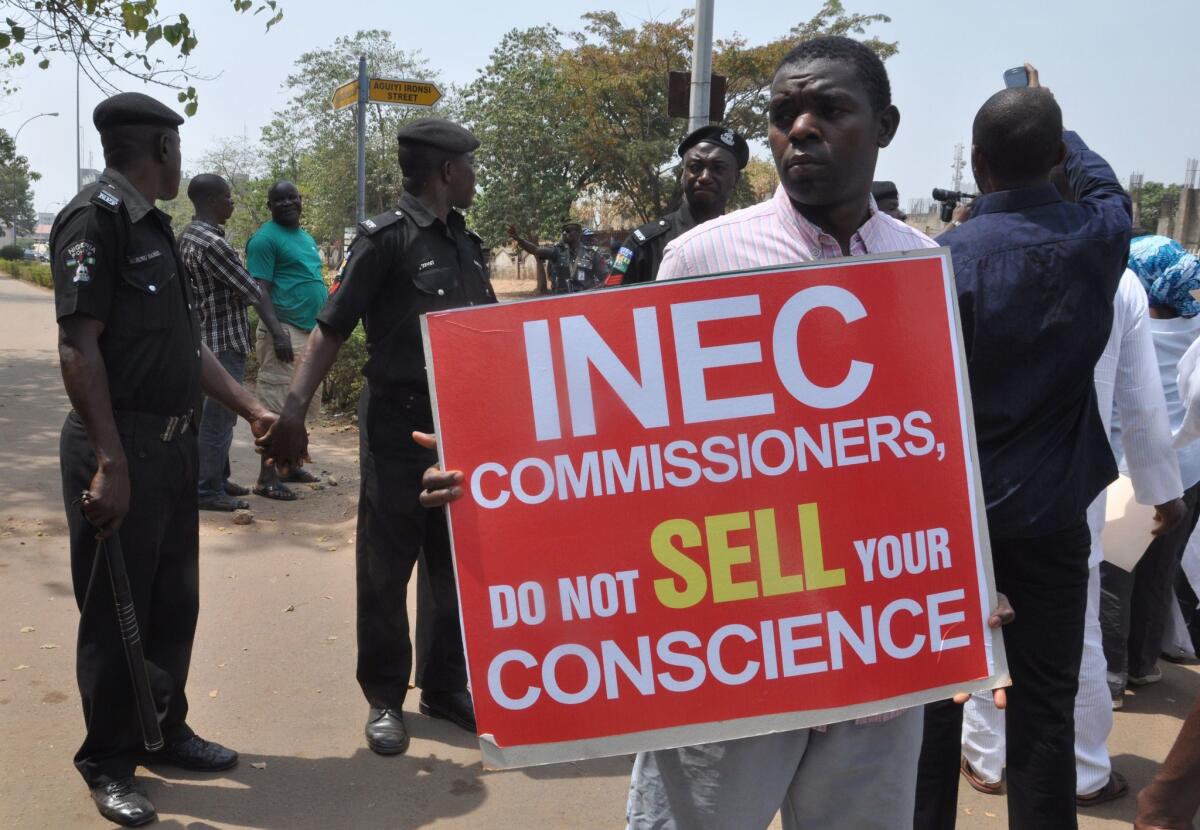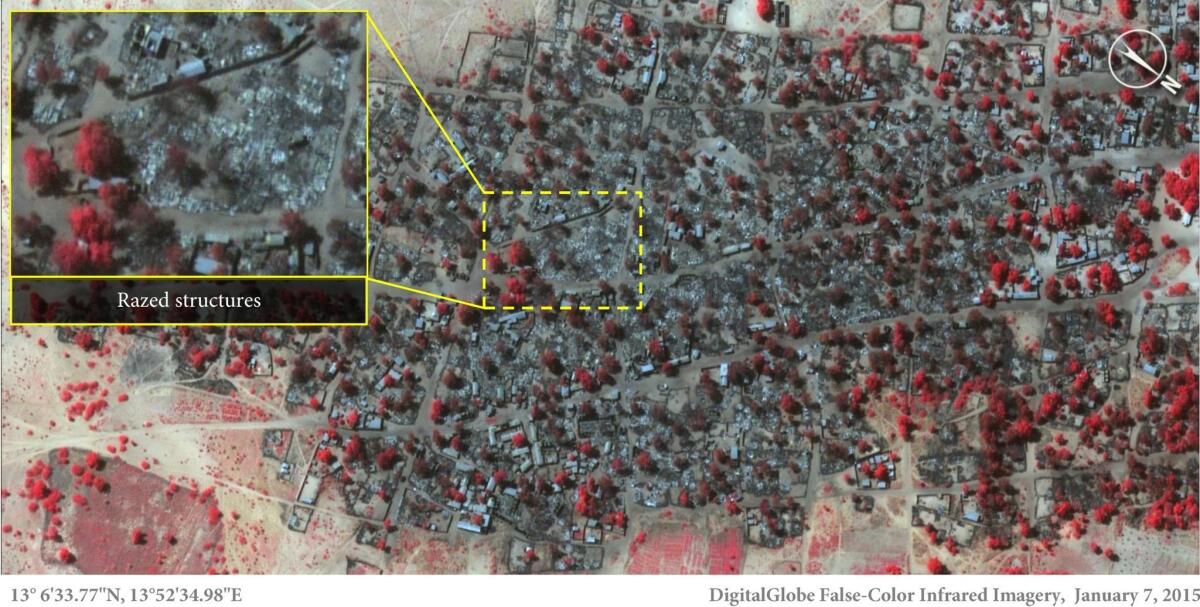Story So Far: How Boko Haram became a growing problem in West Africa

Boko Haram has made national headlines for killing thousands of people in the last 10 years. Here are some things to know about the militant group.
- Share via
Boko Haram, a militant group in West Africa, has seized a vast area of northeastern Nigeria in recent months. The group has burned down villages and killed thousands. Here are some things to know about the group.
What is Boko Haram?Read more
Boko Haram, a Nigeria-based Islamist extremist group, is responsible for numerous attacks in northern and northeastern Nigeria that have killed thousands of people since 2009, according to the U.S. State Department. It has carried out kidnappings, killings, bombings and other attacks on civilian and military targets.
The group's name means "Western education is a sin," and in 2013, the U.S. government designated the group as a foreign terrorist organization.
What are its origins?Full story
Boko Haram emerged in 2002 in Maiduguri, capital of the northeastern state of Borno, under the leadership of Mohammed Yusuf, an Islamist cleric, according to the Council on Foreign Relations think tank. After Yusuf was killed in 2009 by Nigerian security forces, the group became increasingly violent.
The current Boko Haram leader is Abubakar Shekau.

An image from video released July 13 by Boko Haram shows the group's leader, Abubakar Shekau, center. (AFP/Getty Images)
What is the group's aim?Full story
Boko Haram opposes secular education and secular governance, and it seeks to impose a strict interpretation of Islamic law across northern Nigeria.
Where have the attacks been?
 400+ fatalities
400+ fatalitiesNote: As of January. Sources: Internal Displacement Monitoring Center, Armed Conflict Location & Event Data Project
How does it get funding?
Boko Haram receives most of its funding from bank robberies and other criminal activities, such as extortion and kidnapping for ransom, according to the U.S. State Department. At times, it has also received limited assistance, including training and funds, from the militant group Al Qaeda in the Islamic Maghreb.
What are some of its attacks?
What's being done to stop Boko Haram?Full story
Nigeria has been struggling with the insurgents for years. Security forces launched airstrikes on Boko Haram encampments in 2013, and President Goodluck Jonathan announced a state of emergency in three northeastern states that year after failed attempts to negotiate an amnesty and peace deal with the group. Although authorities scaled up military operations in the past, attacks from the group continue.
Nigerian military forces patrol the road that connects the towns of Mubi and Vimtim after the liberation of Mubi in December. According to reports, the military, supported by local militias, retook the town from Boko Haram. (Deji Yake / European Pressphoto Agency)
Nigeria's military drove back Boko Haram Jan. 25 after it attacked Maiduguri, the capital of Nigeria's Borno state. About 200 fighters were killed in the military's air and ground attack, a rare victory in the fight against the militant insurgency. Military officials said they recovered two armed personnel carriers from the group, as well as many anti-aircraft guns and AK-47s.
More than 160 people suspected of having links to Boko Haram were arrested near Niger's border with Nigeria, police in Niger said Feb. 16, according to Agence France-Presse.
Chad, Niger and Cameroon have agreed to send 8,700 troops to help fight the militants in Nigeria. Boko Haram leader Abubakar Shekau said in a video released Feb. 9 that the group would defeat the multinational military force.
Will elections in the region continue despite Boko Haram attacks?
A presidential and parliamentary elections vote was originally scheduled for Feb. 14, but was delayed for six weeks because of insecurity in the country's northeast, where Boko Haram has taken control of dozens of towns, preventing a free and fair vote in the area.

People hold signs to protest the postponement of Nigeria's elections as police officers hold hands to block protesters in the capital city of Abuja on Saturday. The delay was called by the Independent National Electoral Commission, or INEC. (AFP / Getty Images)
Riots broke out after the 2011 elections, after Nigerian politician Muhammadu Buhari and his supporters contested the results. Mobs dragged Christians from their houses in northern towns and killed them. About 800 people were killed.
Did 2,000 people die in the group's Jan. 3 attack?Full story
Maybe not. But hundreds of people were reportedly killed in two towns in northeastern Nigeria by members of Boko Haram.
Doron Baga has been almost wiped off the map, with about 3,100 houses burned down, while 620 houses were set afire in nearby Baga, according to Amnesty International. Although reports circulated that 2,000 people had been killed, it is unknown how many people died. The area remains under control of the fighters, which makes it difficult to verify the toll.
Boko Haram took control of 16 towns and villages in the attacks. The United Nations said more than 7,000 people fled into neighboring Chad and Niger.

A satellite image taken on Jan. 7 and released by Amnesty International shows damage to the town of Doron Baga in northeastern Nigeria after an attack by Boko Haram. (Micah Farfour / Associated Press)
Abubakar Shekau, the leader of the group, said in a YouTube video that the devastation of the attack was nothing compared with future attacks he was planning.
"We are the ones who fought the people of Baga, and we have killed them with such a killing as [God] commanded us in his book," Shekau said. "What you've just witnessed is a tip of the iceberg. More deaths are coming."
In the 35-minute video, Shekau also burned Nigeria's flag and said the country's Constitution is dead.
Los Angeles Times staff writer Robyn Dixon contributed to this report.
UPDATES
Feb. 17, 11:30 a.m. This article was updated with details about the Nigeria elections and efforts to stop Boko Haram.
The first version of this article was published Jan. 14.
Sign up for Essential California
The most important California stories and recommendations in your inbox every morning.
You may occasionally receive promotional content from the Los Angeles Times.








